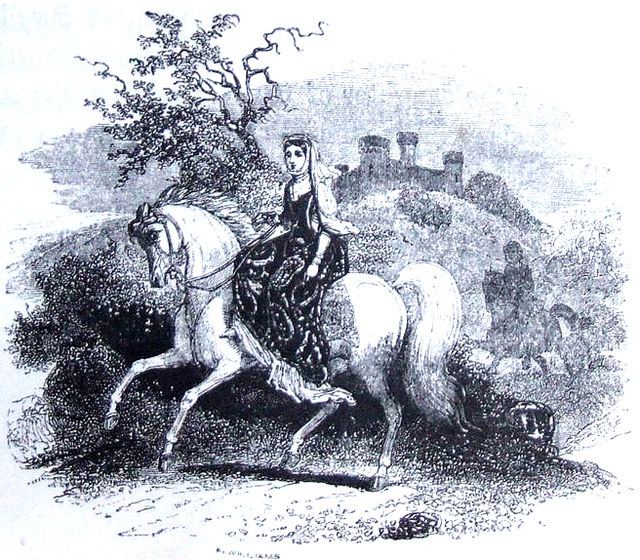Rhiannon is a major figure in Welsh mythology, appearing in the First Branch of the Mabinogi, and again in the Third Branch. Ronald Hutton called her "one of the great female personalities in World literature", adding that "there is in fact, nobody quite like her in previous human literature". In the Mabinogi, Rhiannon is a strong-minded Otherworld woman, who chooses Pwyll, prince of Dyfed, as her consort, in preference to another man to whom she has already been betrothed. She is intelligent, politically strategic, beautiful, and famed for her wealth and generosity. With Pwyll she has a son, the hero Pryderi, who later inherits the lordship of Dyfed. She endures tragedy when her newborn child is abducted, and she is accused of infanticide. As a widow she marries Manawydan of the British royal family, and has further adventures involving enchantments.
Rhiannon riding in Arberth. From The Mabinogion, translated by Lady Charlotte Guest, 1877
Pryderi and Rhiannon's imprisonment, by Albert Herter. From Thomas Wentworth Higginson's Tales of the Enchanted Islands of the Atlantic
Rhiannon is often associated with Epona
Welsh mythology consists of both folk traditions developed in Wales, and traditions developed by the Celtic Britons elsewhere before the end of the first millennium. As in most of the predominantly oral societies Celtic mythology and history were recorded orally by specialists such as druids. This oral record has been lost or altered as a result of outside contact and invasion over the years. Much of this altered mythology and history is preserved in medieval Welsh manuscripts, which include the Red Book of Hergest, the White Book of Rhydderch, the Book of Aneirin and the Book of Taliesin. Other works connected to Welsh mythology include the ninth-century Latin historical compilation Historia Brittonum and Geoffrey of Monmouth's twelfth-century Latin chronicle Historia Regum Britanniae, as well as later folklore, such as the materials collected in The Welsh Fairy Book by William Jenkyn Thomas (1908).

The Two Kings (sculptor Ivor Roberts-Jones, 1984) near Harlech Castle, Wales. Brân the Blessed carries the body of his nephew Gwern.
The opening lines of Lludd and Llefelys (Bodleian Library's manuscript)
History of the Kings (f.75.v) King Arthur
The opening lines of Culhwch and Olwen, from the Red Book of Hergest







